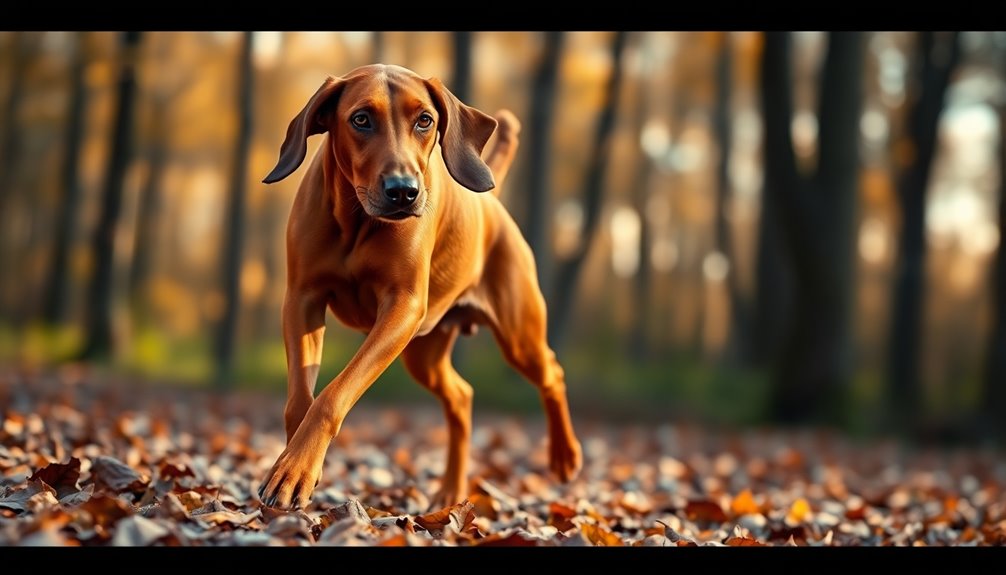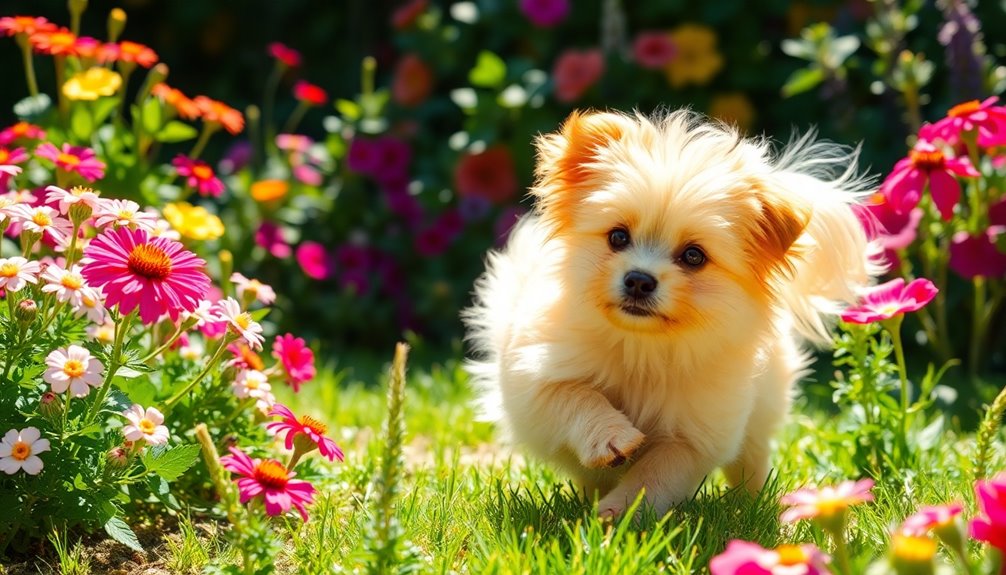If you're looking for an energetic and agile companion, the Rat Terrier might be the perfect fit for you. This lively breed thrives on daily exercise, needing around 30 to 60 minutes to stay happy and healthy. With their muscular build and playful nature, they make excellent partners for outdoor activities. Rat Terriers are not just smart; they're also affectionate and bond closely with families. Their friendly demeanor coupled with strong instincts makes them great watchdogs. Want to explore more about their care, training, and ideal living environments? There's plenty more to discover about this delightful breed!
Key Takeaways
- Rat Terriers are lively, energetic companions requiring 30 to 60 minutes of daily exercise to stay happy and healthy.
- They boast a muscular, compact build, making them agile and playful, perfect for active families.
- Originally bred for pest control, Rat Terriers excel in agility sports and outdoor activities.
- Their affectionate and social nature fosters strong bonds with families and other pets.
- Regular grooming and veterinary care are essential to maintain their health and well-being.
Introduction
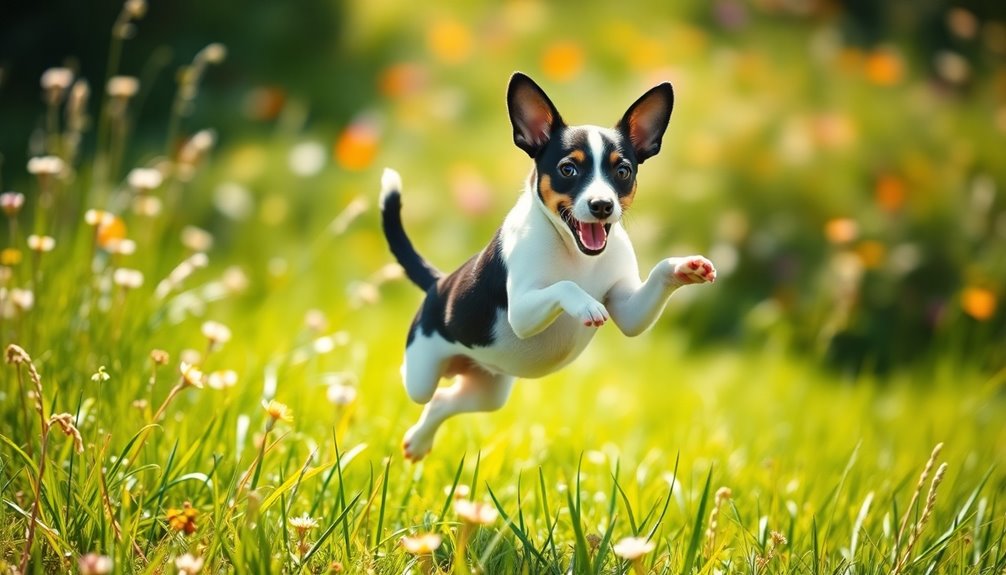
The Rat Terrier is a lively and energetic breed that makes an excellent companion for active individuals and families alike. Standing between 10 to 18 inches tall and weighing between 10 to 25 pounds, these dogs have a muscular, compact, and athletic build that reflects their playful nature.
With a smooth, shiny, and short coat available in various colors like white, black, brown, tan, and gray, they're not just adorable but also relatively low-maintenance in terms of grooming.
Personality-wise, Rat Terriers are intelligent, inquisitive, and affectionate. They thrive on social interactions, though some may be a bit reserved around new faces. Known for their high energy levels, they require ample exercise and mental stimulation to keep them happy and out of trouble. A minimum of 40 minutes of daily exercise is essential to fulfill their activity needs and prevent boredom.
Their strong-willed nature can make training a challenge, but with consistency and patience, you'll find them to be excellent watchdogs, alerting you to any potential intruders.
Whether you're into agility sports or just enjoying daily walks, a Rat Terrier is ready to join the adventure, making them an ideal companion for those who love an active lifestyle.
History and Origin
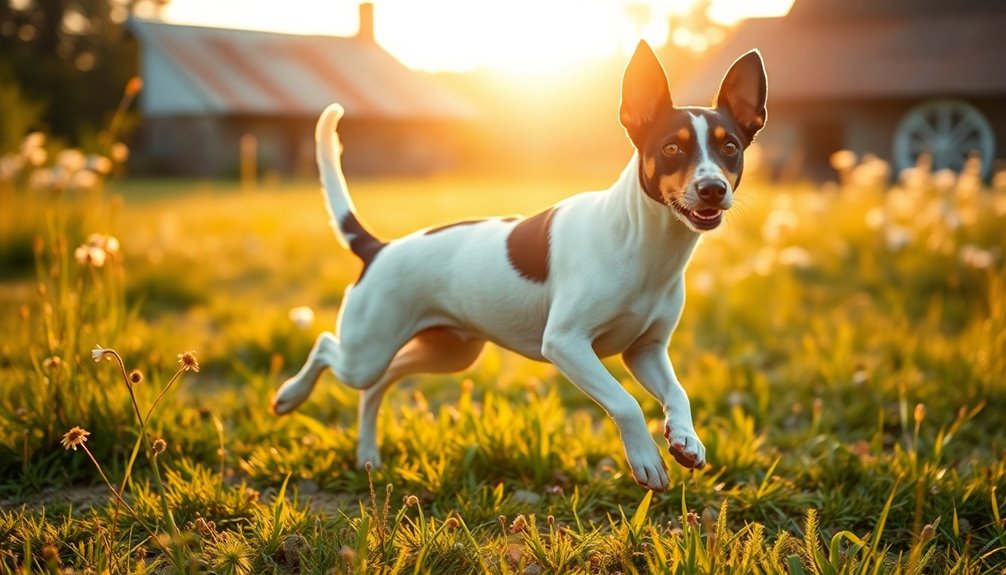
The Rat Terrier originated in England around 1820 through a cross between Smooth Fox Terriers and Manchester Terriers. These dogs were initially bred for their exceptional skills in pest control, particularly in rat-killing contests. Their strong historical connection to farm utility further solidified their role as a valuable companion for many families.
Where and when the breed originated
Originating in England during the early 19th century, Rat Terriers emerged from a mix of Smooth Fox Terriers and Manchester Terriers.
These foundational breeds contributed essential traits: Smooth Fox Terriers brought speed and agility, while Manchester Terriers added strength and tenacity. Other European Terriers, like the now-extinct Old English White Terrier and Black and Tan Terrier, further influenced the breed, enhancing its character and abilities.
By the 1890s, Rat Terriers made their way to the United States. American breeders quickly recognized their potential and began to modify the breed for local needs.
They crossed Rat Terriers with Beagles to enhance pack instincts and hunting capabilities. Additionally, breeding with Whippets introduced further refinement, speed, and muscularity. This selective breeding was aimed at improving the breed's speed and versatility for various roles on farms.
The result was a versatile and adaptable breed, tailored for a variety of tasks. As the breed developed, its unique traits became more pronounced, leading to recognition by the American Kennel Club in 2013.
This rich history illustrates how the Rat Terrier evolved through careful breeding practices, ultimately becoming the energetic and agile companion you know today.
Farm Pest Control
Rat Terriers quickly became indispensable on farms in the late 1800s and early 1900s, serving as the primary means of rodent control before the advent of modern pesticides. With poisons and commercial farming techniques still in their infancy, these agile dogs were your best defense against pesky rodents like rats and mice. Their speed and hunting instincts made them incredibly effective; in a single day, they could eliminate over 100 rats.
As their popularity grew, farmers appreciated their humane approach to pest control. Unlike poison, which can lead to slow, painful deaths and environmental contamination, Rat Terriers provided a chemical-free solution that didn't harm wildlife or farm animals. Their ability to flush rodents out of hiding spots and dispatch them quickly made them invaluable allies on the farm. Modern rat control methods have evolved, yet the effectiveness of trained terriers remains unmatched in many settings.
While the rise of pesticides in the 1940s diminished their prominence, breeders continued to focus on their hunting abilities. Incorporating Rat Terriers into your pest control strategy can keep rodent populations in check while also ensuring a more humane and environmentally friendly approach to managing farm pests.
Physical Characteristics
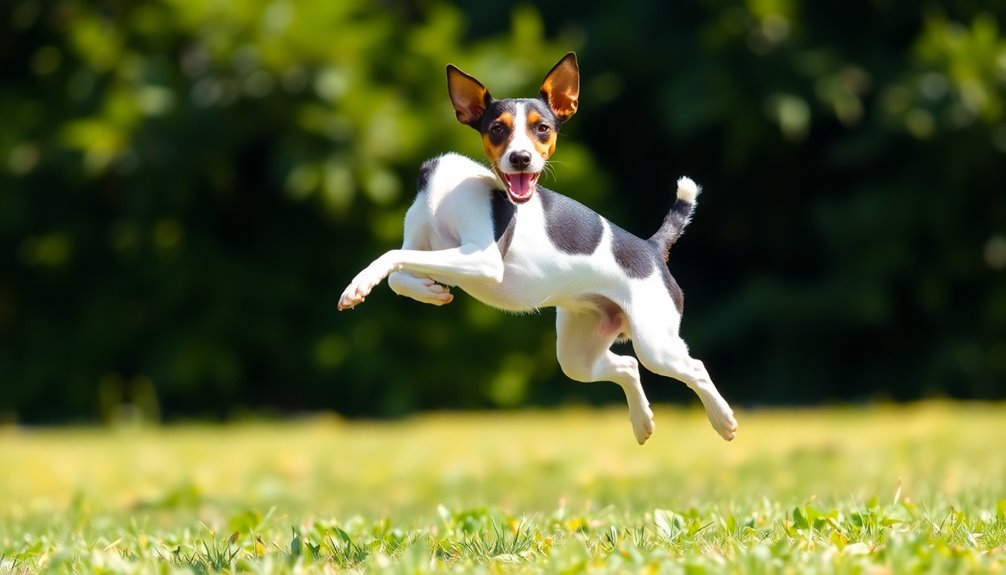
When you look at a Rat Terrier, you'll notice their compact size, typically standing between 10 to 18 inches tall and weighing anywhere from 10 to 35 pounds. Their single, smooth coat comes in various striking colors, often featuring eye-catching patterns. With a short, muscular build, these dogs are both agile and robust, perfect for an active lifestyle. They can weigh anywhere from 10 to 25 pounds, making them suitable for various living situations.
Size, weight, and coat details
Typically, Rat Terriers showcase a range of physical characteristics that make them easily identifiable. Their height varies from 10 to 18 inches at the shoulder, with miniature types standing between 10 to 13 inches and standard types exceeding that, reaching up to 18 inches. Males usually tend to be larger than females, and they typically reach their full height between 9 to 12 months of age. Additionally, full height is reached earlier for miniatures around 9 months compared to standards.
In terms of weight, you can expect them to weigh anywhere from 10 to 25 pounds. Miniature Rat Terriers weigh between 10 to 18 pounds, while standard ones range from 18 to 25 pounds. Their weight can vary depending on the specific type, and they may continue to gain muscle mass even after reaching their full height.
When it comes to their coat, Rat Terriers sport a short, straight, and sometimes coarse texture. Their smooth, shiny coats come in various colors, including white, black, brown, tan, and gray.
While grooming is relatively easy, you'll need to manage moderate to high shedding and occasional knotting to keep their coats healthy and looking great. Regular care ensures your companion stays comfortable and vibrant.
Short, Muscular Build
Boasting a short, muscular build, the Rat Terrier stands out with its athletic and lean physique. Despite their small size, these dogs exhibit a visibly toned structure, especially in their hind legs. Their muscles are defined but not bulging, showcasing a perfect balance between strength and agility.
This breed's well-bent stifles provide flexibility, which contributes to a smooth and speedy gait. You'll notice their parallel hocks, which enhance balance and allow for precise turns. With a shorter hock, they enjoy full extension, aiding in jumps and overall movement. The Rat Terrier's structural integrity is vital, ensuring that their body can support vigorous activities without compromising balance. Proper hock alignment is essential for maintaining their agility and endurance during play.
To maintain their muscular build, regular exercise is crucial. They thrive on daily walks, play, and engaging activities that challenge their agility and obedience. A balanced diet rich in protein is essential for sustaining their lean physique.
Moreover, mental stimulation is necessary to keep them from becoming bored, which can lead to destructive behavior. With the right care, your Rat Terrier will embody the perfect blend of strength and energy, making them an ideal companion for active households.
Temperament and Personality
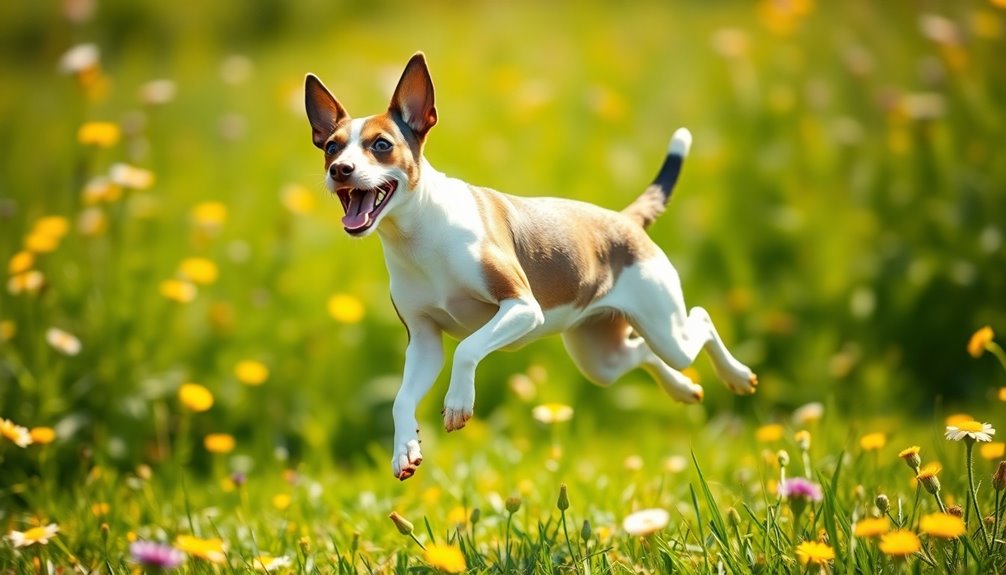
Rat terriers are known for their playful and spirited demeanor, making them fantastic companions for families and individuals alike. Their affectionate nature allows them to bond well not just with humans, but also with other pets when properly socialized. With their lively energy, they thrive in environments where they can engage and interact regularly. Their high energy level necessitates daily exercise and mental stimulation to keep them happy and healthy.
Playful and Spirited Demeanor
While their small stature might suggest otherwise, these spirited dogs are full of energy and playfulness that can light up any room. Rat Terriers thrive on physical activity and mental stimulation, making them perfect companions for those who enjoy an active lifestyle. Their need for daily exercise is crucial to their overall well-being.
You'll find that engaging them in games like fetch or providing interactive toys helps channel their abundant energy, keeping boredom and destructive behaviors at bay.
Their intelligence is remarkable, and they're always eager to learn new tricks. However, their independent streak can make training a bit challenging at times. Consistency and positive reinforcement are key to successfully teaching them.
With early socialization and exposure to various environments, they develop into well-rounded companions.
Beyond their playful nature, Rat Terriers are affectionate and loyal, forming strong bonds with their families. They're gentle and loving, thriving on human companionship, which makes their playful antics even more endearing.
Their alertness and curiosity keep them on their toes, as they're always ready to investigate their surroundings.
In short, a Rat Terrier's playful and spirited demeanor ensures you'll never have a dull moment by their side.
Suitability for families, individuals, or other pets
When considering a Rat Terrier as a companion, it's essential to understand just how adaptable and loving these dogs can be. They thrive in family settings, displaying a patient and affectionate nature, especially when raised with children. However, supervision is key to prevent accidental injuries. Proper training can also help mitigate any undesirable behaviors that may arise from their energy levels.
Their protective instincts may lead them to be wary of strangers, so early training and socialization are crucial.
For individuals, Rat Terriers suit those with an active lifestyle. Their compact size makes them ideal for smaller living spaces, and they form strong bonds with their owners, offering loyal companionship. Rat Terriers are known for their high energy levels, which makes them great companions for those who enjoy outdoor activities. They often require consistent training to channel their energy positively and avoid becoming overly dominant.
While they can be stubborn, consistent training helps manage this trait.
When it comes to other pets, Rat Terriers generally get along well with dogs, especially when they match energy levels. However, they can be bossy, so adequate training is necessary.
Introducing them to cats or small animals requires a gradual approach due to their hunting instincts and potential prey drive. Always monitor their interactions to maintain harmony within your home.
With the right environment and guidance, Rat Terriers can be wonderful companions for families, individuals, and even other pets.
Health and Lifespan
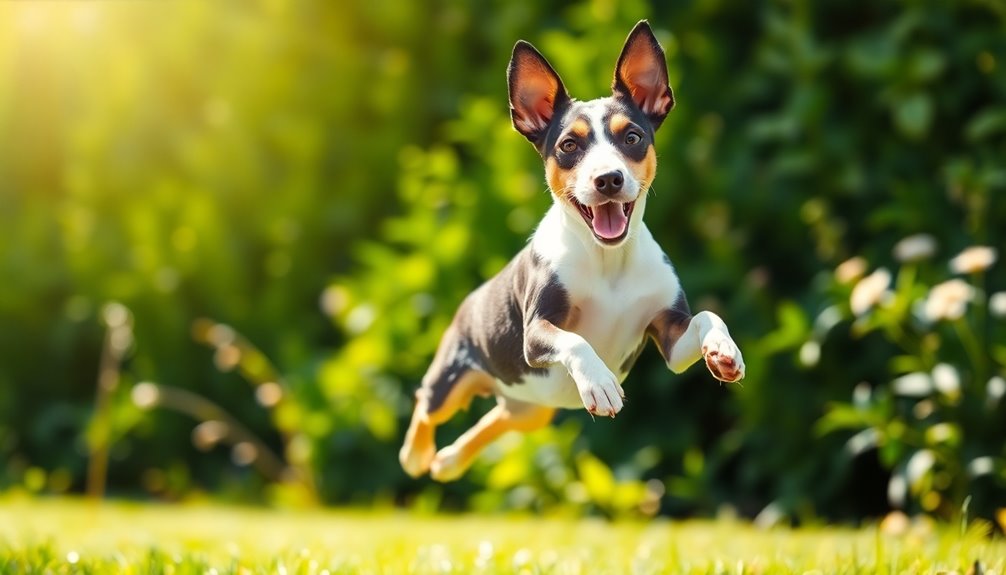
When it comes to your Rat Terrier's health and lifespan, you should be aware of common issues like patellar luxation and cardiac abnormalities. These dogs typically live between 12 to 18 years, but with proper care, some even reach 23. Keeping up with regular vet visits, a balanced diet, and plenty of exercise can significantly enhance their well-being and longevity. Additionally, their increased popularity has led to a rise in certain health issues that owners should monitor. Furthermore, it is essential to be mindful of financial planning for veterinary care, as unexpected health issues can arise.
Typical lifespan of the breed
Understanding the typical lifespan of a Rat Terrier reveals that these energetic companions can live anywhere from 15 to 18 years, with some even reaching up to 23 years with proper care. This impressive longevity reflects the breed's hardiness and genetic diversity.
To ensure your Rat Terrier enjoys a long, healthy life, focus on proper care and maintenance. Regular health check-ups and preventive care are crucial in managing any potential health issues.
While the breed's compact size doesn't significantly affect lifespan, their sturdy and athletic build contributes positively to their longevity. Both miniature and standard Rat Terriers generally have similar lifespans, proving that care and genetics play a more significant role than size.
Their high intelligence and active nature can also enhance their overall health, making them resilient companions. Providing daily exercise is essential for maintaining their physical and mental well-being, which ultimately supports their longevity. When you provide a balanced diet and an active lifestyle, you're setting your Rat Terrier up for success.
This breed is generally healthy, boasting a longer lifespan compared to other breeds of similar size. By prioritizing their well-being, you'll maximize the joyful years you share together.
Common health concerns or genetic predispositions
Rat Terriers, like all breeds, can face specific health concerns and genetic predispositions that potential owners should be aware of. Allergies are common in these dogs, with food, contact, and inhalant allergies affecting their quality of life. Skin issues like demodicosis, caused by mites, can also arise.
Hypothyroidism and epilepsy are other conditions you might encounter, alongside degenerative myelopathy, which impacts the spinal cord. Additionally, Rat Terriers generally have a lifespan of 13 to 18 years, so regular health checks are essential to monitor any emerging conditions that may arise as they age.
Musculoskeletal issues can be a concern too. Legg-Calve-Perthes disease and patellar luxation are painful conditions that may affect your pup, while malocclusion and retained puppy teeth can lead to dental problems. Additionally, joint issues may worsen if your Rat Terrier becomes obese.
Eye and ear problems aren't uncommon either. Primary lens luxation and progressive retinal atrophy can lead to serious vision issues, and some bloodlines have a risk of heritable deafness.
Finally, keep an eye out for dental disease, which affects many dogs, and be vigilant against infections and parasites. Awareness of these potential health concerns can help you give your Rat Terrier the best care possible.
Tips for maintaining health and wellness
How can you ensure your Rat Terrier enjoys a long, healthy life? Start by scheduling regular veterinary check-ups. These annual wellness exams are crucial for catching health issues early and keeping up with vaccinations.
Since Rat Terriers can be prone to heart conditions, make sure to discuss heart examinations and preventive measures like flea, tick, and heartworm prevention with your vet.
Feeding your Rat Terrier a balanced diet is equally important. Serve two meals a day, focusing on high-protein and carbohydrate foods designed for medium-sized dogs. Additionally, ensure that you are aware of their weight management needs by adjusting portions based on their activity level.
Limit table scraps and treats to maintain their healthy weight.
Exercise is vital for your energetic companion. Aim for at least 1-2 hours of activity daily, including running, fetch, or agility training. This not only manages energy levels but also prevents obesity.
Don't forget grooming! Brush your Rat Terrier's coat weekly, bathe them as needed, and keep their nails trimmed.
Regular dental care is essential too—offer safe chewing options that support dental hygiene without extra calories.
Engaging in mental activities, like puzzle toys, will keep your intelligent Rat Terrier stimulated and happy.
Care Requirements

Caring for your Rat Terrier involves a few simple yet essential tasks.
You'll appreciate their minimal shedding and easy grooming routine, but don't forget the exercise they need to keep their energy levels in check. Regular exercise of at least 20-30 minutes is essential to meet their high energy requirements.
Additionally, providing a balanced diet is crucial for their overall health and well-being.
Minimal Shedding, Easy Grooming
With low to moderate shedding, the Rat Terrier is a breed that's relatively easy to groom. You'll find that they shed year-round, but with two distinct cycles in spring and fall. While some may shed more due to genetic variations, healthy Rat Terriers typically have minimal shedding.
To keep their coat looking great, brush your Rat Terrier at least once a week to remove loose hairs and prevent tangles. An occasional bath, every few months with a mild dog shampoo and conditioner, can help further reduce shedding. Additionally, seasonal changes can contribute to increased shedding, particularly in spring and fall.
Don't forget about regular nail trims, which prevent discomfort and related shedding issues. Additionally, clean their ears regularly to avoid wax buildup, and brush their teeth at least three times a week for overall dental health.
Invest in quality grooming tools, like a slicker brush and de-shedding tools designed for short-haired breeds. Supplement their diet with omega-3 fatty acids and consider using shed control shampoos for optimal coat health.
Exercise requirements and energy levels
To keep your Rat Terrier happy and healthy, regular exercise is essential, as these energetic dogs need between 30 to 60 minutes of physical activity each day.
It's best to break this up into several sessions rather than one long stretch. Aim for a minimum of 20-30 minutes devoted to brisk walks or jogs. Younger dogs typically require even more exercise than their older counterparts.
Engaging in various types of exercise will keep your Rat Terrier mentally and physically stimulated. Enjoy brisk walks, runs, or playtime in a securely fenced yard. Additionally, their playful and happy-go-lucky attitude makes them eager participants in any activity. Incorporating educational and skill-building toys can also provide additional mental challenges during playtime.
Games like fetch and tug-of-war can also provide great outlets for their energy. Consider agility training or dog sports for added fun and stimulation.
Feeding tips and diet recommendations
Feeding your Rat Terrier a balanced diet is crucial for their overall health and vitality. Focus on high-quality dog food that includes protein, carbohydrates, and healthy fats.
Tailor their nutrition to their age and size—puppies need more nutrients, particularly proteins and fats, while adults require a balanced diet to maintain energy levels. Senior dogs benefit from low-fat food to manage their weight and support joint health. It's essential to consider ingredient quality when selecting dog food to ensure optimal nutrition.
Pay attention to any food sensitivities your Rat Terrier might have. Some dogs do better on grain-free diets or foods without artificial preservatives and fillers.
Transitioning to raw or fresh food may also improve their digestive health. Incorporate specific ingredients like glucosamine for joint support, omega-3 fatty acids for heart health, and antioxidants like Vitamins E and C for overall well-being.
Always consult with your veterinarian to determine the best diet for your Rat Terrier. They can provide tailored recommendations based on your dog's specific needs, ensuring your companion stays healthy and active throughout their life.
Prioritize their nutrition, and you'll notice the positive effects on their energy levels and overall health.
Training and Socialization
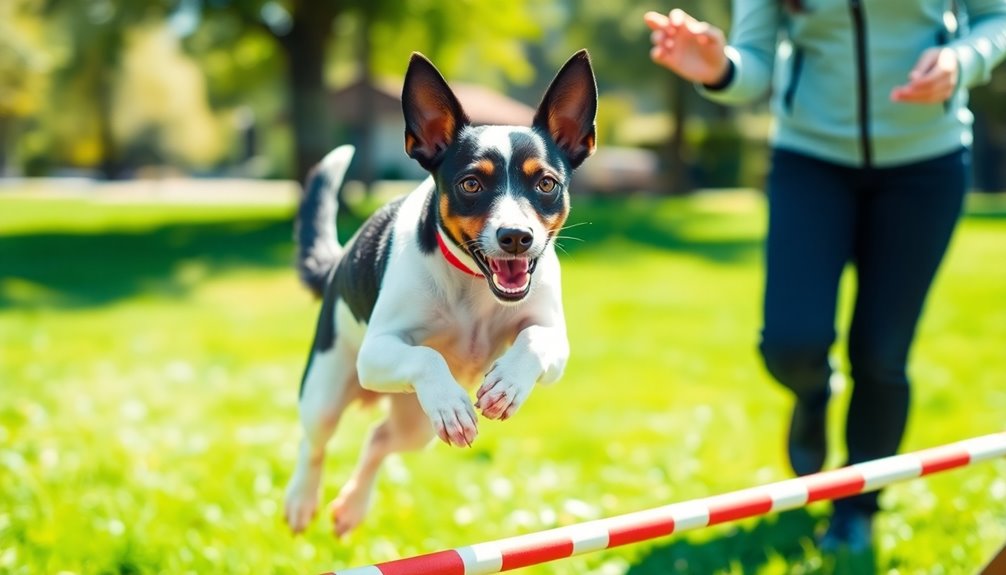
Training your Rat Terrier requires patience and consistent practice, as they're moderately responsive to commands. You'll need to introduce new friends gradually to ensure positive interactions, especially since they can be prone to jumping and digging when excited. Incorporating regular exercise into their routine can significantly enhance their focus during training sessions.
Moderately Responsive to Commands
Rat Terriers can be moderately responsive to commands, making effective training essential for a harmonious relationship. To engage your Rat Terrier, use positive reinforcement—reward desired behaviors with treats, praise, or toys.
Start with key commands like "sit," which you can teach by holding a treat above their nose and moving it back. Reward them as soon as they sit. Consistency and structure are crucial; incorporate training into your daily routine for better results. Training should be fun to maintain engagement and motivation, especially since successful training leads to safety for your pet. Incorporating activities like hula hooping can also provide a fun way to engage their energy and improve your bond.
Expect some challenges during training. Rat Terriers may show stubbornness and may not always follow commands immediately, especially with distractions present. Keep sessions fun and rewarding to maintain their interest.
Early training, particularly from puppyhood, makes the process easier. Use a patient and gentle approach; a firm but kind voice works best.
In addition to basic commands, consider teaching tricks or games like fetch to provide mental stimulation and strengthen your bond. By focusing on these effective training methods, you'll help your Rat Terrier become a well-behaved companion, ready to tackle new challenges and experiences together.
Gradual Introductions to New Friends
Building on the foundation of effective training, socialization plays a vital role in helping your Rat Terrier thrive in various environments. Start introducing your pup to a variety of sights, sounds, people, and animals early on. Ensure these experiences are positive to help build confidence and comfort. Engaging in play with other dogs can enhance their executive function by teaching them to manage their impulses and emotions.
Begin with low-intensity exposures, gradually increasing the difficulty as your dog becomes more comfortable. Controlled interactions are essential. Choose calm and friendly individuals for your Rat Terrier to meet, ensuring these experiences are supervised, especially around young children or other pets.
Introduce new pets slowly, reinforcing good behavior with treats and praise. It's also crucial to identify and manage triggers that may cause anxiety or barking. Observe your dog's reactions and use counter-conditioning techniques to change their emotional response. Additionally, remember that early socialization is crucial for Rat Terriers to help them feel comfortable in various situations.
Gradually expose your pup to these triggers while rewarding calm behavior. Remember that consistent training routines and a distraction-free environment will help your Rat Terrier focus. Be patient and persistent, as they may exhibit a stubborn streak.
Socialization is an ongoing process, so continue to expose your dog to new experiences throughout their life to maintain and improve their social skills.
Jumping and Digging Tendencies
Jumping and digging are common tendencies in Rat Terriers, often driven by their high energy levels and natural instincts. To manage these behaviors, regular exercise is essential. Daily walks and play sessions can help burn off excess energy, reducing both jumping and digging. Proactive training can prevent jumping before it becomes an issue.
Without adequate stimulation, your Rat Terrier may become restless, leading to increased jumping or destructive digging.
Training methods play a crucial role. Utilize positive reinforcement to teach your dog to keep all four paws on the ground. Commands like "off" can be effective, and rewarding calm behavior reinforces this learning.
Consistency is key; make sure everyone in your household follows the same training routine.
Socialization also impacts these tendencies. Exposing your Rat Terrier to various environments and people from an early age can help alleviate anxiety-related jumping. If your dog is well-adjusted, it'll be less prone to jumping in new situations.
For digging, redirect your dog's attention to acceptable activities whenever it starts digging. Providing a safe, enriched environment can also minimize this behavior.
Ideal Living Environment
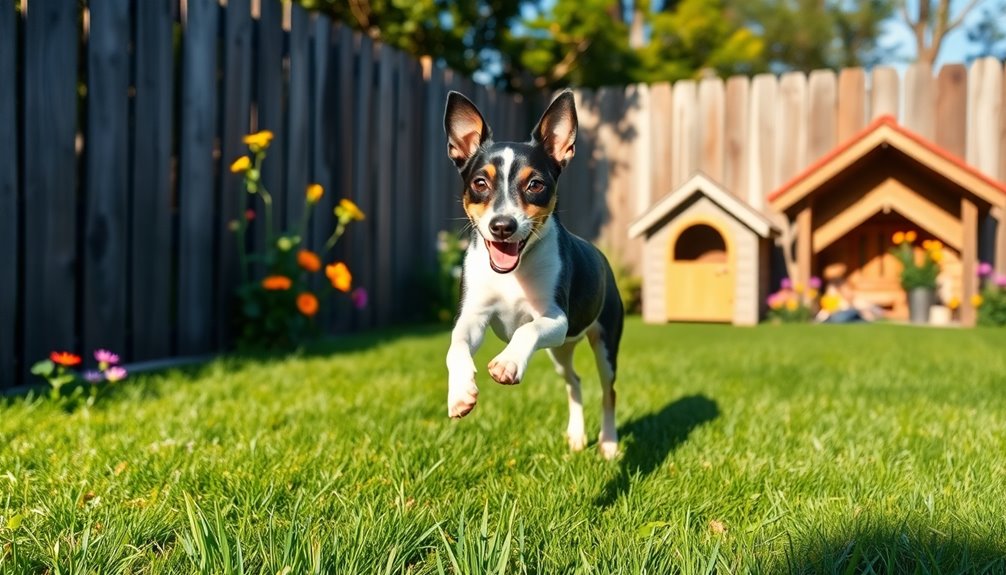
If you're considering a Rat Terrier, a house with secure fencing is essential to keep them safe and contained. These energetic dogs thrive in environments that can handle heat and humidity, so ensure your home is comfortable year-round. Additionally, their frequent barking means that you should be prepared to manage sound sensitivity in your living environment. With the right setup, your Rat Terrier will flourish and enjoy their time both indoors and outdoors.
House With Secure Fencing
Creating a secure environment for your Rat Terrier starts with a well-fenced yard that meets their energetic needs. To keep your agile companion safe, ensure your fence is at least 5-6 feet tall to prevent any jumping attempts. Durable materials like vinyl, block, brick, or stone provide the strength necessary to withstand wear and tear over time.
Opt for solid panels or smooth surfaces to make climbing difficult. Preventing digging is also crucial. Install bottom barriers such as metal strips or large rocks about 1-2 feet below the surface to deter escape attempts. Securing the bottom rail at ground level and adding wire mesh at the base can further minimize gaps.
Remember, picket fences are less effective due to their wider slats; choose solid fences that block visual distractions. Additionally, consider a combination fence with a block bottom and wrought-iron top for stability and visibility. Consider your dog's habits to ensure the selected fencing option meets their specific needs.
To enrich your yard, include toys and agility equipment, which can help reduce restlessness and the urge to escape. Dense shrubs along the fence line can act as a natural deterrent, ensuring your Rat Terrier stays safe and happy in their secure space.
Heat Tolerance and Humidity Preference
Rat Terriers thrive in a variety of climates, but their heat tolerance and humidity preference play a crucial role in their well-being. With minimal fur and lean bodies, they're designed to dissipate heat effectively. Their short coats and efficient panting mechanisms help keep them cool during warm weather, making them more comfortable in temperatures ranging from 60ºF to 90ºF.
When it gets hotter than 90ºF, limit your Rat Terrier's outdoor time to short bursts of 10-15 minutes, and avoid outings when temperatures drop below 32ºF. For optimal health, plan outdoor activities during the early morning or evening, providing plenty of shade and fresh water. Regular breaks in shaded areas are essential to prevent overheating. Dogs enjoy sunbathing until overheated, then seek shade, so it's important to watch for signs of overheating like heavy panting.
Though they can thrive in hot and humid environments, it's crucial to monitor them closely and offer access to air-conditioned spaces. They love outdoor play, but you must manage their activity level according to the weather.
With proper care, your energetic Rat Terrier can enjoy the sunny days while staying safe and happy.
Rat Terriers Excel in Agility
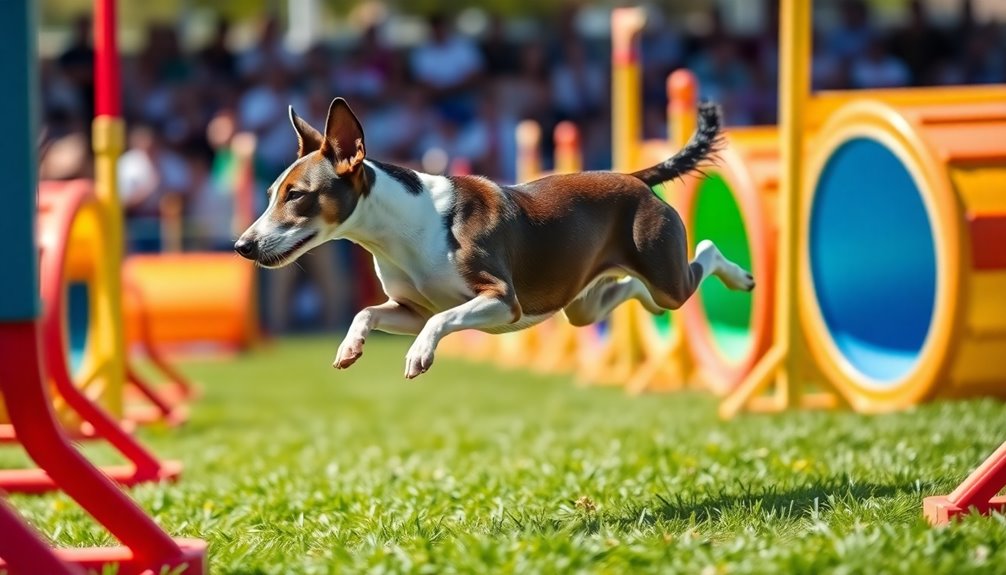
If you're looking for a dog that shines in agility, Rat Terriers are a fantastic choice. Their versatility allows them to excel in various dog sports, showcasing their athleticism and quick reflexes. You might even spot them featured in popular media, like 'Ratchet & Clank', proving just how dynamic these little athletes can be. Their enthusiasm and drive make them a favorite in performance events, where they consistently demonstrate their impressive skills.
Versatile in Various Dog Sports
Excelling in various dog sports, Rat Terriers showcase their remarkable agility and versatility. You'll find these energetic companions competing in agility, obedience, lure coursing, and even barn hunt events. Their natural athleticism shines as they tackle challenges like Fast CAT, where their prey drive can truly be tested.
Thanks to their intelligence and eagerness to please, Rat Terriers are easily trainable. Using positive reinforcement methods is key to maintaining their enthusiasm and avoiding any rebellious antics. By enrolling them in obedience training classes, you can strengthen your bond and enhance communication, making them well-rounded partners. In fact, many Rat Terriers, like Kit, have won awards at prestigious events such as the Eukanuba AKC Performance Games.
These dogs thrive on physical activity, requiring 1-2 hours of exercise daily. Their lithe bodies and high energy levels make them excel in demanding activities, both physically and mentally.
Whether it's agility competitions or terrier racing, Rat Terriers demonstrate their strong hunting instincts, earning titles and recognition in various performance events, including the Eukanuba AKC Performance Games. Their achievements not only inspire you but also encourage others to participate in dog sports.
With a Rat Terrier by your side, you're guaranteed a dynamic and engaging experience in the world of dog sports.
Featured in 'Ratchet & Clank
How do Rat Terriers become stars in the world of agility? Their impressive physical capabilities and boundless energy make them natural contenders. With athleticism that shines through, these dogs navigate obstacle courses with jumps, tunnels, and weave poles effortlessly. Additionally, their quick learning ability allows them to master complex routines with practice and patience.
The combination of their high energy levels and intelligence ensures they thrive in agility training. To keep their minds engaged, agility training offers essential mental stimulation for your Rat Terrier. Using positive reinforcement techniques, you can guide them through courses, rewarding their successes and encouraging them to learn new tricks. Additionally, their high intelligence makes them highly trainable, facilitating quicker learning and mastery of agility skills.
Setting up agility courses at home gives them consistent training opportunities, allowing them to practice regularly. Daily exercise is crucial for Rat Terriers, with at least 20-30 minutes of structured activity required. They love playing fetch or enjoying outdoor romps, so incorporating agility work into their routine keeps them happy and healthy.
Remember, variety keeps boredom at bay, preventing behavior problems. These energetic companions not only excel in agility but also form strong bonds with their humans, proving to be affectionate, loyal, and watchful.
With the right training and care, your Rat Terrier could shine in agility competitions!
Active Lifestyle Compatibility?
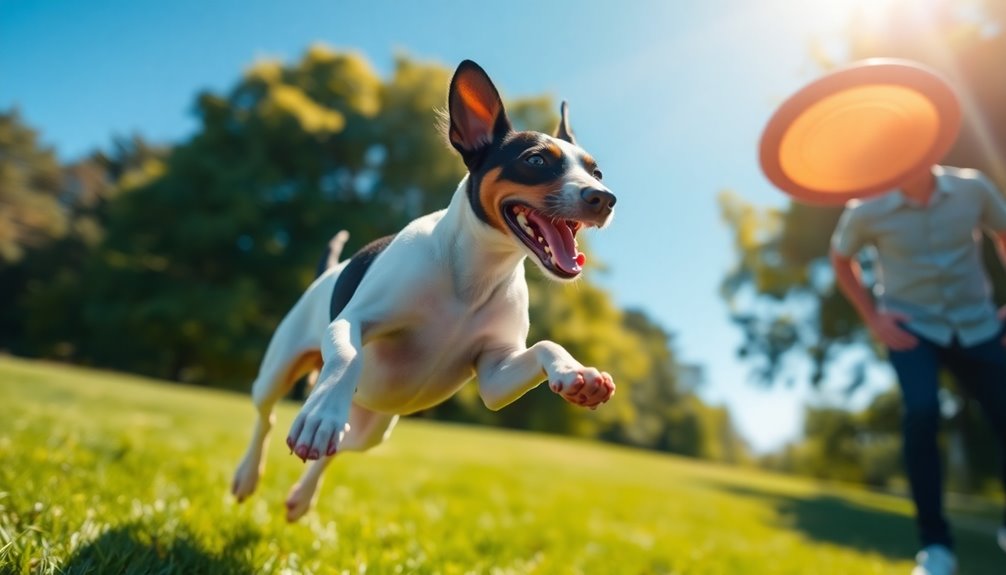
If you lead an active lifestyle, a Rat Terrier could be the perfect companion for you.
With their high energy levels, they thrive in households where they can engage in daily exercise and play. Just remember, they need at least 30-60 minutes of activity each day to keep them happy and healthy. Their average lifespan of 12-18 years means you can enjoy many years of companionship with a Rat Terrier as you embark on outdoor adventures together. Additionally, incorporating active toys can enhance their physical activity and promote emotional intelligence, which is crucial for their well-being.
Great for Active Households
For families leading an active lifestyle, Rat Terriers can be the perfect companion. Their patient and gentle demeanor makes them ideal for homes with young kids, as they thrive on attention and love being involved in family activities. Whether you're hiking, biking, or playing in the backyard, these dogs fit seamlessly into your routine. Additionally, their high energy levels require regular physical exercise and mental stimulation to keep them happy and healthy.
One of the best features of Rat Terriers is their adaptability. They can thrive in various living environments, from spacious farms to cozy apartments. This versatility allows them to adjust to different family dynamics and routines, ensuring they're a great match for both urban and rural households.
Rat Terriers also coexist well with other pets, provided they've received proper socialization. Their strong bonds with family members lead to loyalty and affection, enhancing your household's warmth.
Plus, their vigilant nature makes them excellent watchdogs, alerting you to anything unusual while still being friendly with visitors.
In short, if you're an active family looking for a loving, adaptable, and social pet, a Rat Terrier could be the perfect addition to your home. Their energetic spirit and eagerness to be part of the action will keep your household lively and engaged.
High Energy and Exercise Needs
Rat Terriers bring not just companionship but also a high energy level that demands an active lifestyle. To keep them happy and healthy, you'll need to provide at least 30-60 minutes of exercise each day, broken up into multiple sessions.
Engage in brisk walks, runs in securely fenced areas, or fun games of fetch to keep their spirits high. Activities like agility training are also highly recommended for mental and physical stimulation. Regular exercise helps to prevent boredom-related behaviors, ensuring they remain well-adjusted and content.
These dogs thrive on challenges, so incorporating puzzle toys and interactive games into their routine is essential. Without adequate mental engagement, they may become anxious or display destructive behaviors such as excessive barking and digging.
Make training sessions enjoyable with positive reinforcement to keep their intelligent minds occupied. While they love to chase and dig, avoid overly strenuous activities that might strain their joints.
Rat Terriers excel in canine sports, making them perfect for active households. If their exercise needs aren't met, you might find them restless at night or acting out.
Prioritize their exercise and mental stimulation, and you'll enjoy a happy, well-rounded companion.
Frequently Asked Questions
What Are Common Behavioral Issues in Rat Terriers?
Common behavioral issues in rat terriers include high energy levels leading to destructive behavior, anxiety caused by a lack of structure, and a strong prey drive.
You might notice excessive barking, hiding, or stubbornness during training. Without regular exercise and socialization, they can become bored or stressed.
Establishing clear rules, providing mental stimulation, and using positive reinforcement will help you manage these behaviors effectively, ensuring a happy and well-adjusted companion.
How Do Rat Terriers Interact With Children?
When you introduce a Rat Terrier to children, you'll find they're generally patient and playful.
However, you need to supervise their interactions to ensure safety for everyone involved. Teach the kids to be gentle and respectful to avoid rough handling.
Early socialization is key, helping your dog feel comfortable around young ones.
With proper training and attention, your Rat Terrier can thrive in a family environment, bonding closely with your children.
Are Rat Terriers Good Watchdogs?
Yes, Rat Terriers are excellent watchdogs. Their natural alertness and strong protective instincts make them quick to react to unfamiliar sounds or sights.
You'll find they bark to alert you of potential threats, despite their small size. With proper training and socialization, they can channel their instincts positively, reducing unwanted behaviors.
Their loyalty to your family and readiness to defend make them reliable companions when it comes to keeping your home safe.
What Foods Are Best for a Rat Terrier?
To keep your Rat Terrier healthy, focus on a high-protein diet rich in carbohydrates.
Look for food that includes glucosamine and omega-3 fatty acids to support joint and skin health. Incorporate prebiotics and probiotics for digestive wellness.
Ensure the meals are balanced with essential vitamins and minerals tailored to their life stage—puppy, adult, or senior.
Always provide fresh water, especially for growing pups, to keep them hydrated and thriving.
How Often Should I Groom My Rat Terrier?
You should groom your Rat Terrier at least once a week. This includes brushing their short coat to remove dead hairs and reduce shedding.
Bathing is typically needed only once a month unless they get dirty.
Regularly trim their nails, clean their ears weekly, and brush their teeth at least three times a week.
Don't forget to check for any skin issues during grooming sessions to keep your pup healthy and happy!
Conclusion
In conclusion, Rat Terriers make fantastic companions for those who enjoy an active lifestyle. Their energetic nature, agility, and friendly temperament ensure they fit right into your daily adventures. With the right training and socialization, they'll thrive in various environments, bringing joy and enthusiasm to your home. If you're looking for a loyal, playful partner for your pursuits, this breed could be the perfect match for you. Embrace the energy and let the fun begin!


